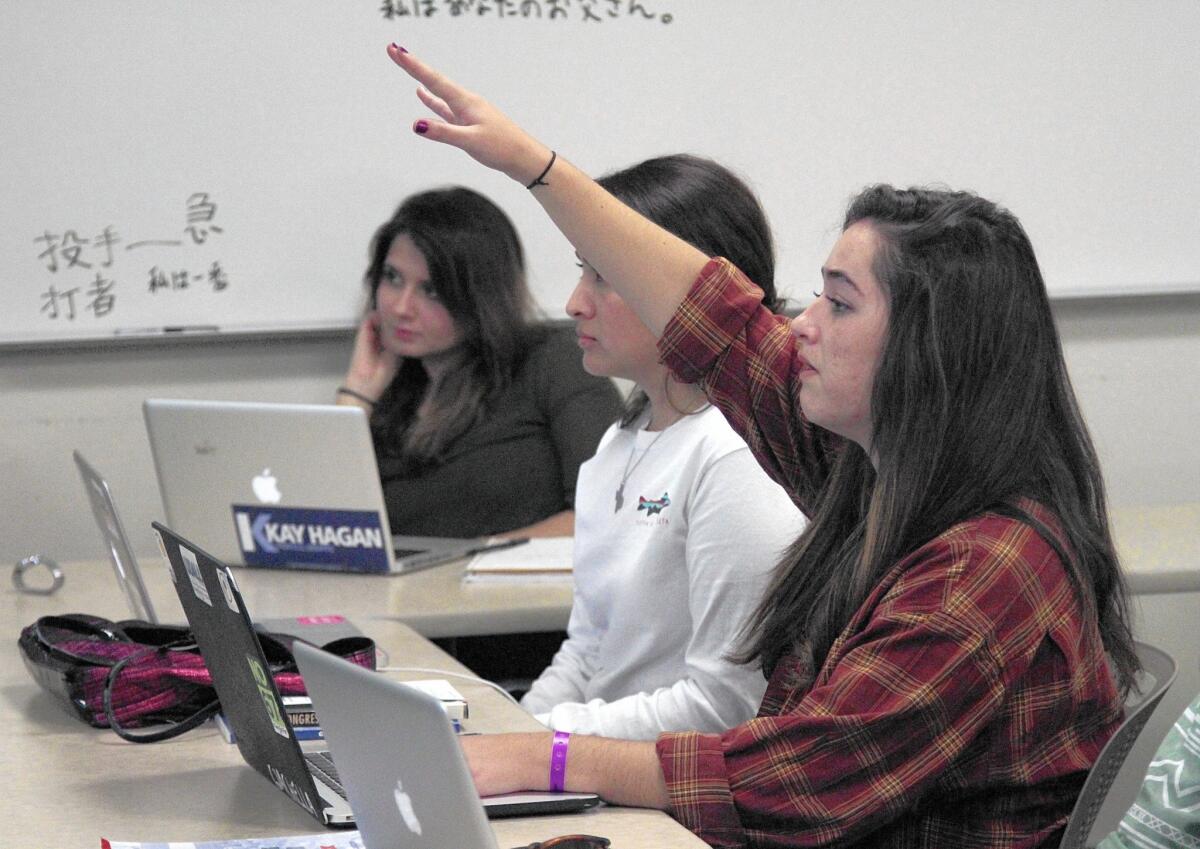Occidental students confront a reality of political campaigns: defeat

- Share via
The midterm elections were over. The 11 campaign workers from Occidental College returned to class. But first, they heard from a school reverend.
“You win some, you lose some,” Susan Young told the group. It’s perfectly OK, she said, to have trouble readjusting to college life or to feel out of place.
In what is believed to be the only college program of its kind, the undergraduates in the Campaign Semester course spent at least 2 1/2 months, often seven days a week, 12 hours a day, working on behalf of candidates in contested states.
None won.
Many were resoundingly defeated, although two students worked for the reelection campaign of Sen. Mary Landrieu of Louisiana, who is in a runoff. All of the students worked for Democratic candidates; Republicans swept the mid-terms and took control of the House and Senate.
The results were the first for Occidental’s biannual program, in which students spend the beginning of a semester working in the field and then return to campus, studying campaign tactics and political theory, discussing their experiences and the results of the election.
In addition to talking about the finer points of voter engagement and campaign donations, the students also talk about the more unsavory aspects of democracy: negative ads, doors slammed in your face and what it’s like to live on pizza for weeks at a time. And, for this group, what it’s like to feel depressed and cry after your candidate loses.
For many, the process was an eye-opening experience.
“I don’t think our representative government is broken, but I do think it’s become less democratic and it’s difficult to get good people in office,” said Joshua Wodka, a fifth-year senior who worked for North Carolina Sen. Kay Hagan and admits he still hasn’t recovered from her loss. “I’m exhausted.… I’m annoyed.”
Campaign Semester began in 2008 when many Occidental students wanted to work for Hillary Clinton or then-Sen. Barack Obama, who attended the Eagle Rock campus for two years before transferring in 1981.
Students participating in the program receive full college credit for volunteering. They can work for candidates in either party but it must be in a battleground state. In the past, undergraduates have worked for such candidates as Mitt Romney and Linda Lingle, a Republican who unsuccessfully ran for a Senate seat in Hawaii in 2012.
Some current students said the semester on the campaign trail was one of the main reasons they decided to attend the liberal arts college. “It was a big draw,” said junior Hannah Kaminsky.
Kaminsky got an internship with Mark Udall, a Democratic senator from Colorado.
Like all students, Kaminsky had to find her own housing; she stayed with another Udall staffer. When she first started working, Kaminsky put a copy of Ernest Hemingway’s “The Sun Also Rises” next to her bed, thinking she’d have time to read a few pages a night.
“I never even opened it,” she said.
Instead, Kaminsky spent hours working campaign events, stuffing envelopes and making phone calls.
Other students worked in the field, trying to get out the vote. Many said they were reluctant to call strangers or knock on doors in the beginning. “I kind of hated doing it at first,” said senior Sophia Tieman, who also worked for the Hagan campaign.
Tieman said Republicans once confronted her while she was wearing a Hagan T-shirt and many people seemed annoyed when she rang doorbells, but she had grown a thicker skin by the end of the campaign.
“I wanted to tell them, ‘I’m here to be helpful,’” she said.
Most said they were shocked when their candidates lost. Kaminsky was so sure that Udall would be reelected that when the race was called in his opponent’s favor, the news didn’t sink in for a few moments, she said.
“It was devastating,” Kaminsky said, especially since she realized that many of the other people she had been working with didn’t know what they would do next. “Everyone was out of a job,” she said.
Other students were even more emotional. Early election night, Tieman started driving from one campaign office to another when Hagan was in the lead. She sang aloud as she drove, excited for the victory.
When it was clear Hagan was going to lose, Tieman began “gross-sobbing and ugly-crying.”
“It felt like everything I had poured my heart and soul into ended up not meaning anything,” she said.
The two professors teaching the course — Peter Dreier and Regina Freer — were concerned enough that they asked the religious counselor to visit the class. They said their students seemed to be coping well.
They’re “mature enough to realize that this was part of a national trend that may have been unstoppable this year,” said Dreier, a politics professor.
Or, as junior Daniel Stigall put it: “The pity party is over.”
Stigall worked for Texas gubernatorial candidate Wendy Davis.
The students still have to write several papers and do homework, but they meet for class only a few times a week, a drastic change from their active campaign lifestyle. Many are living in dorms, but Wodka, the senior, said he’s been staying with family in Fullerton to “decompress and reflect.”
Wodka, who once considered being a lawyer, said “it would be easy to walk away and say I’m done.”
Instead, he’s decided to put off any plans of graduate school and will attend Occidental’s semester in Washington, D.C., in the spring. In the future, he’d like to return to North Carolina politics.
“The state will be a huge player in 2016,” he said.
Twitter: @latjasonsong
More to Read
Sign up for Essential California
The most important California stories and recommendations in your inbox every morning.
You may occasionally receive promotional content from the Los Angeles Times.














